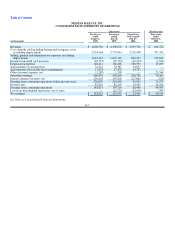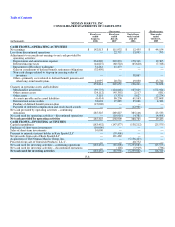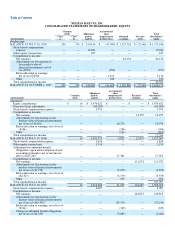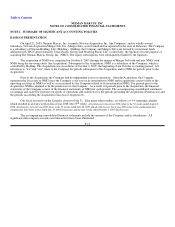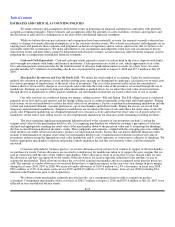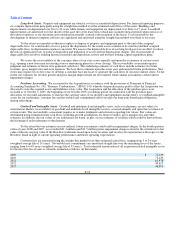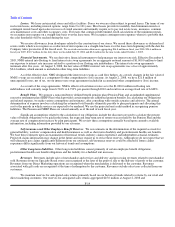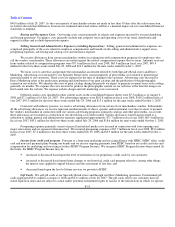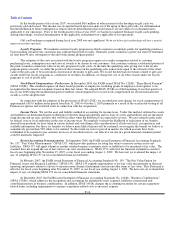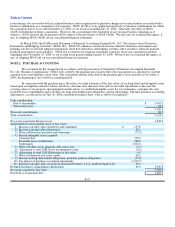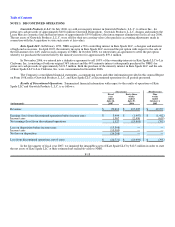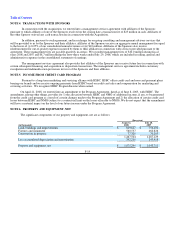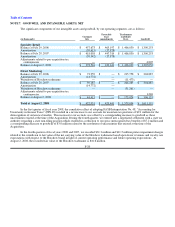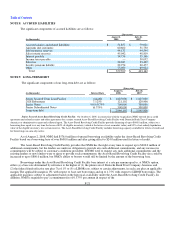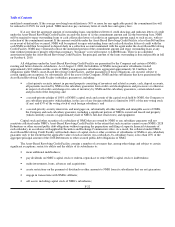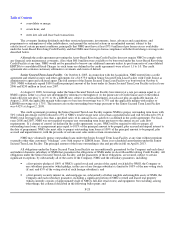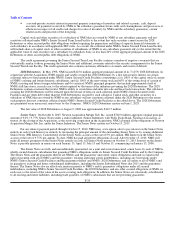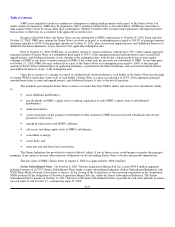Neiman Marcus 2007 Annual Report Download - page 101
Download and view the complete annual report
Please find page 101 of the 2007 Neiman Marcus annual report below. You can navigate through the pages in the report by either clicking on the pages listed below, or by using the keyword search tool below to find specific information within the annual report.
Table of Contents
$48.8 million at July 28, 2007. As the vast majority of merchandise returns are made in less than 30 days after the sales transaction,
we believe the risk that differences between our estimated and actual returns will have a material impact on our consolidated financial
statements is minimal.
Buying and Occupancy Costs. Our buying costs consist primarily of salaries and expenses incurred by our merchandising
and buying operations. Occupancy costs primarily include rent, property taxes and operating costs of our retail, distribution and
support facilities and exclude depreciation expense.
Selling, General and Administrative Expenses (excluding depreciation). Selling, general and administrative expenses are
comprised principally of the costs related to employee compensation and benefits in the selling and administrative support areas,
preopening expenses, advertising and catalog costs and insurance expense.
We receive allowances from certain merchandise vendors in conjunction with compensation programs for employees who
sell the vendors' merchandise. These allowances are netted against the related compensation expense that we incur. Amounts received
from vendors related to compensation programs were $71.6 million in fiscal year 2008, $65.4 million in fiscal year 2007, $49.4
million for the forty-three weeks ended July 29, 2006 and $10.1 million for the nine weeks ended October 1, 2005.
We incur costs to advertise and promote the merchandise assortment offered by both Specialty Retail stores and Direct
Marketing. Advertising costs incurred by our Specialty Retail stores consist primarily of print media costs related to promotional
materials mailed to our customers. These costs are expensed at the time of mailing to the customer. Advertising costs incurred by
Direct Marketing relate to the production, printing and distribution of our print catalogs and the production of the photographic
content on our websites. We amortize the costs of print catalogs during the periods we expect to generate revenues from such catalogs,
generally six months. We expense the costs incurred to produce the photographic content on our websites at the time the images are
first loaded onto the website. We expense website design and web marketing costs as incurred.
Deferred catalog costs included in other current assets in the consolidated balance sheets were $7.5 million as of August 2,
2008 and $7.1 million as of July 28, 2007. Net advertising expenses were $102.8 million in fiscal year 2008, $100.2 million in fiscal
year 2007, $95.3 million for the forty-three weeks ended July 29, 2006 and $13.1 million for the nine weeks ended October 1, 2005.
Consistent with industry practice, we receive advertising allowances from certain of our merchandise vendors. Substantially
all the advertising allowances we receive represent reimbursements of direct, specific and incremental costs that we incur to promote
the vendor's merchandise in connection with our various advertising programs, primarily catalogs and other print media. As a result,
these allowances are recorded as a reduction of our advertising costs when earned. Vendor allowances earned and recorded as a
reduction to selling, general and administrative expenses aggregated approximately $75.7 million in fiscal year 2008, $63.4 million in
fiscal year 2007, $43.1 million for the forty-three weeks ended July 29, 2006 and $18.6 million for nine weeks ended October 1, 2005.
Preopening expenses primarily consist of payroll and related media costs incurred in connection with store openings and
major renovations and are expensed when incurred. We incurred preopening expenses of $7.7 million in fiscal year 2008, $8.8 million
in fiscal year 2007, $7.4 million for the forty-three weeks ended July 29, 2006 and $3.9 million for the nine weeks ended October 1,
2005.
Income from credit card program. Pursuant to a long-term marketing and servicing alliance with HSBC, HSBC offers credit
card and non-card payment plans bearing our brands and we receive ongoing payments from HSBC based on net credit card sales and
compensation for marketing and servicing activities (HSBC Program Income). We recognize HSBC Program Income when earned. In
the future, the HSBC Program Income may be:
• increased or decreased based upon the level of utilization of our proprietary credit cards by our customers;
• increased or decreased based upon future changes to our historical credit card program related to, among other things,
the interest rates applied to unpaid balances and the assessment of late fees; and
• decreased based upon the level of future services we provide to HSBC.
Gift Cards. We sell gift cards at our Specialty Retail stores and through our Direct Marketing operations. Unredeemed gift
cards aggregated $34.1 million at August 2, 2008 and $33.1 million at July 28, 2007. The gift cards sold to our customers have no
stated expiration dates and are subject to actual and/or potential escheatment rights in various of the jurisdictions in which we operate.
F-15



